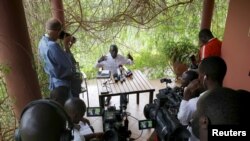Human rights activists are denouncing a new Ugandan directive to scrutinize journalists working for foreign media.
On Thursday, Paul Ekochu, the chairman of the Ugandan government’s Media Council, said journalists working in the country for foreign outlets must register anew and submit to a vetting process, or risk having criminal charges brought against them.
Ekochu argued the scrutiny is needed if journalists’ security is to be guaranteed.
He recalled all the accreditation cards possessed by journalists working for foreign media, saying new ones with security features will be issued after reporters re-register.
“In the next seven days, all media practitioners in these media houses and in the country are registered with the media council and issued with the relevant press tag, which will allow them access, coverage of public events, state events and in particular, these elections,” he said, referring to the January 14 presidential election.
Ekochu said those who do not comply may face criminal penalties.
“Two, it’s a criminal offense under the law to do what you have been told to practice without a certification when you have been informed you should certify yourself," he said. “Three, it’s again a criminal offense to disobey a lawful order.”
Growing concern
Liam Taylor, who co-chairs the Foreign Correspondents Association of Uganda, said journalists are increasingly concerned about the arbitrary, ambiguous and ever-changing rules the Ugandan state is imposing, saying the rules interfere with their work.
“Coming just weeks before elections, this is very worrying indeed,” Taylor said. “That’s a disturbing precedent. And, we are not asking for any special treatment. All we want is the right to do our work.”
Local journalists are also required to apply for renewal of their press passes by the end of the year.
Robert Sempala, National Coordinator of the Human Rights Network for Journalists in Uganda, said these are moves by the government to prevent journalists from reporting on some presidential candidates.
“The timing, who gives seven days to accredit journalists nationally? Who does that if it is well intentioned? But also, to create this feeling of fear, that you have an accreditation that is newly issued so you have to be extremely careful,” Sempala said.
Call for protection
Muthoki Mumo, the Sub Saharan representative for the Committee for Protection of Journalists, noted that the new guidelines are disingenuous and do not focus on journalists’ safety despite the Media Council’s claims.
“Identifying them differently is not the solution here,” she said. “Stop obstructing the work of journalists, start protecting journalists, investigate attacks on journalists. Holding those who’ve attacked journalists, whether they are security personnel or members of the public, accountable is the solution to the issue of safety of journalists on the campaign trail.”
The new guidelines come just days after accredited journalists working for the Canadian Broadcasting Corporation were deported from Uganda.




